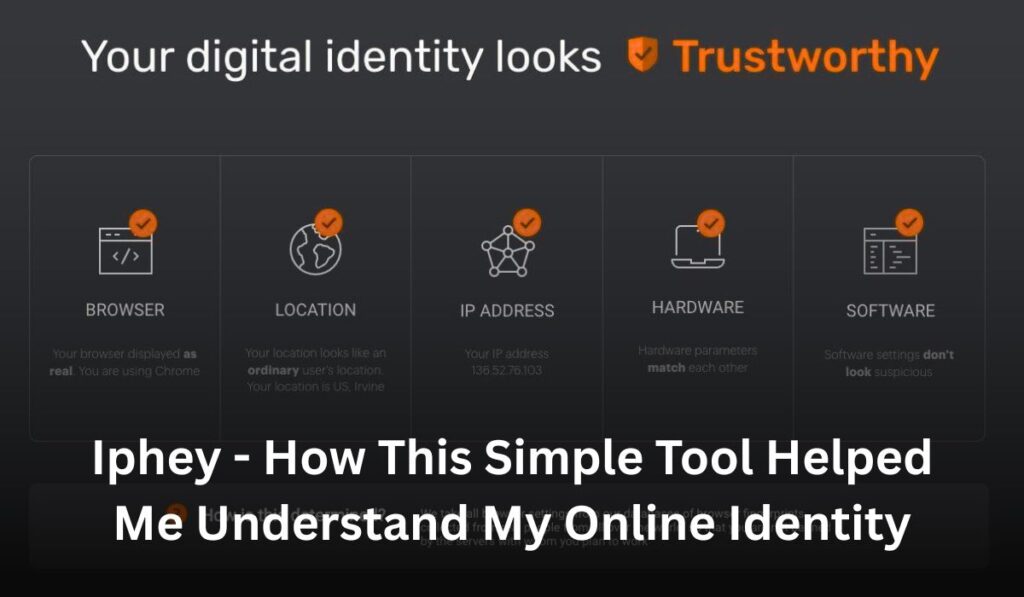
It started on a quiet Sunday afternoon.
Rain was tapping softly on the window, and my laptop hummed beside a half-empty mug of coffee. I wasn’t doing anything special — just browsing, watching videos, reading random tech blogs — the usual.
Then, out of nowhere, I stumbled upon something that would completely change how I looked at my digital life.
The name was simple: Iphey
At first, I thought it was just another tech tool. I’d seen a hundred like it — privacy checkers, VPN testers, proxy analyzers. But there was something about the way it described itself that made me stop and think:
“Iphey helps you understand how websites see you.”
I remember reading that line twice.
It felt strange, even unsettling, to think that websites could “see” me — not just my clicks or time on page, but my digital fingerprint, my browser, my IP, even my habits
That curiosity — and a bit of paranoia — pushed me to open the site.
A Peek Behind the Digital Curtain
The moment I hit “Analyze,” I expected a quick report, maybe a list of cookies or trackers. But instead, it felt like someone had opened a window into my digital soul.
Iphey started listing things I had never even thought about.
- My browser version, exact to the decimal.
- My operating system, with build details.
- My screen resolution, my time zone, my language settings.
- Even my IP address and where it placed me on the map — my city, my network type, and whether I was using a VPN.
For a second, I froze.
Everything that I thought was private, everything that I thought was hidden behind my screen — was right there, exposed.
It was as if someone had quietly been taking notes about me every time I opened a website.
That’s when it hit me: the internet knows us more than we know ourselves.
The Invisible You Online
We often think of our online presence as usernames, social profiles, or maybe an email address. But Iphey showed me that the real identity — the one that websites recognize — goes far deeper.
Every time you visit a page, your browser says hello.
And in that hello, it tells a story.
It tells what browser you’re using, what extensions are installed, what fonts you have, what time zone you’re in, even how much RAM your computer has. Combine all that, and suddenly — you’re not just a visitor; you’re a fingerprint.
Iphey calls this the “browser fingerprint.”
It’s unique, just like a real fingerprint.
And that’s why trackers love it.
Even if you clear cookies or use incognito mode, this fingerprint often remains consistent. It’s how advertisers and analytics companies can recognize you across sessions, devices, and even websites.
That realization was both fascinating and frightening.
Curiosity Turned to Obsession
Over the next few hours, I tested everything.
I opened Iphey using Chrome, then Firefox, then Brave.
Each time, the report changed slightly — new browser version, different plugins, new user-agent string. But no matter how many times I switched, there was always something unique.
I turned on a VPN. Iphey detected it instantly.
I switched proxies — it caught that too.
I even tried an “anti-detect browser,” just to see how well it masked me
And that’s when Iphey really impressed me.
It didn’t just say, “you’re using a VPN.” It explained why it thought that — by analyzing the mismatch between my IP geolocation and system time, or the encryption parameters in my TLS handshake.
It was like watching a detective piece together my online disguise, bit by bit.
I couldn’t help but admire it.
This wasn’t some generic privacy tool; this was digital forensics simplified for anyone.
What Iphey Actually Does (In Simple Words)
Let me explain this in the simplest way I can, the way I wish someone had explained it to me that day.
When you visit a website, your browser automatically sends little bits of data — called headers — to tell the site how to display content correctly. Iphey listens to those headers and pieces together your online identity.
Here’s what it checks:
- Browser Version & User-Agent – It identifies which browser you’re using (like Chrome 127.0.6533.85) and what device it belongs to.
- Operating System – Whether it’s Windows, macOS, Linux, or Android.
- IP & Location – Where your IP address says you are, and if it matches your timezone.
- Hardware Details – Things like screen size, graphics card, and device memory.
- Cookies & Storage – Whether websites can store tracking data in your browser.
- WebRTC & DNS Leaks – If your real IP is leaking, even behind a VPN.
- TLS Fingerprint – The unique encryption pattern that identifies your browser during secure connections.
- Proxy/VPN Detection – Whether you’re masking your IP and how effective that masking is.
After analyzing all this, Iphey gives you a “trust score.”
It’s not about moral trust — it’s about how “normal” or “suspicious” your digital fingerprint appears compared to millions of others.
If your browser looks too unique — maybe you’ve disabled JavaScript, changed too many headers, or use an uncommon setup — websites might flag you as suspicious.
That’s how online systems decide who’s a bot, who’s a real user, and who might be hiding behind layers of spoofing.
The Emotional Side of Online Identity
Here’s the part that surprised me the most:
As I looked at my Iphey report, I didn’t feel just technical curiosity. I felt vulnerable.
It reminded me that even when I’m home, behind a screen, wrapped in the comfort of my privacy, I’m never truly invisible.
There’s always a trace.
Always a reflection.
Always a version of “me” being recorded somewhere — not my face, but my data.
And that thought made me rethink everything:
How many websites know my IP?
How many have tracked me across devices?
How much of my “digital self” is floating around in data centers I’ll never see?
It was sobering. But it was also empowering.
Because the more I understood about how I was being tracked, the better I could protect myself.
Iphey as a Teacher, Not Just a Tool
That’s what makes Iphey different.
It doesn’t just show you data — it teaches you awareness.
Each section of the analysis feels like a small lesson:
- When it tells you your IP’s geolocation, you learn how easy it is to pinpoint someone.
- When it highlights inconsistent headers, you realize how websites detect spoofing.
- When it shows your TLS fingerprint, you understand how deep tracking really goes.
In that sense, Iphey isn’t about paranoia. It’s about education.
You start caring more about your digital hygiene — checking your privacy settings, rotating your IPs, or clearing local storage once in a while.
You begin to see your browser as more than a window to the internet — it’s a mirror reflecting everything you are, technically and behaviorally.
The Bigger Picture – Digital Awareness
Over the next few weeks, I introduced Iphey to friends and colleagues. Most of them had never even heard of browser fingerprinting.
When they ran their first tests, their reactions were the same as mine: shock, curiosity, disbelief.
One friend said, “So even if I delete cookies, websites can still recognize me?”
“Yes,” I said, “because your fingerprint never lies.”
We talked about VPNs, anti-detect browsers like GoLogin or Multilogin, and the importance of tools that randomize your fingerprint to protect anonymity.
That’s when I realized — privacy isn’t just about hiding. It’s about understanding what you reveal.
Iphey gives you that understanding.
It lets you see what others see — not to make you paranoid, but to make you powerful.
How to Stay Safe (Lessons I Learned)
Here are the small but powerful lessons I’ve carried since that day:
- Use VPNs wisely – Not all VPNs are equal. Some leak DNS or WebRTC data. Iphey helped me test which ones actually worked.
- Rotate your IPs – Consistent IPs can build a tracking pattern. Residential proxies or rotating IPs make you harder to profile.
- Mind your browser fingerprint – If you use anti-detect browsers, keep configurations human-like, not too perfect.
- Limit JavaScript – Many trackers rely on JavaScript to gather device details. Disabling it when not needed helps.
- Clear cookies and storage – Old cookies tell long stories. Wipe them clean once in a while.
- Don’t panic about being unique – Some uniqueness is inevitable. The goal isn’t invisibility — it’s control.
Iphey and the Future of Digital Identity
As privacy becomes more valuable, tools like Iphey represent the next generation of user empowerment.
They bridge the gap between complex cybersecurity analysis and everyday internet users.
Iphey doesn’t need you to be a hacker, an analyst, or a network engineer.
It just needs your curiosity.
And in return, it gives you visibility — the kind that makes you pause before clicking, think before logging in, and care before you share.
In a world drowning in data, awareness is the first step toward safety.
A Reflective Thought on Growth and Resilience
That rainy afternoon changed something in me.
It wasn’t just about discovering a tool — it was about rediscovering control.
I realized that privacy isn’t about fear.
It’s about boundaries — knowing where your data begins and where you draw the line.
The internet will always evolve — more tracking, smarter analytics, deeper fingerprints. But so will we.
We’ll keep learning, adapting, and protecting.
And maybe that’s what growth really means in the digital age — not erasing your footprints, but understanding them deeply enough to walk with confidence.
So the next time you open your browser and visit a website, remember: you’re not just a user.
You’re a digital identity — complex, unique, and powerful.
And thanks to tools like Iphey, you finally get to meet that version of yourself.






